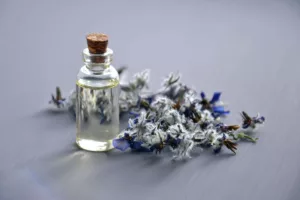Essential Oils 101

Clear, radiant skin is a universal aspiration, and many of us strive to achieve it through various skincare products and routines. However, nature offers a powerful ally in this quest for clear skin – essential oils. These concentrated extracts from plants are packed with potent compounds that can address a wide range of skin issues, from acne and blemishes to uneven tone and texture. In this beauty blog, we’ll explore the best essential oils for clear skin, how they work, and how to incorporate them into your skincare regimen for a naturally flawless complexion.
The Quest for Clear Skin
Achieving clear skin goes beyond just aesthetics; it’s also about feeling confident and comfortable in your own skin. Healthy skin is a reflection of overall well-being, and essential oils can play a crucial role in maintaining it. Here’s why clear skin is essential:
1. Boosted Confidence
Clear skin boosts your confidence and self-esteem. When you look good, you feel good, and this confidence can positively impact all aspects of your life.
2. Enhanced Self-Care
Taking care of your skin is an act of self-care. It’s a daily ritual that allows you to pause, pamper yourself, and prioritize your well-being.
3. Improved Overall Health
Clear skin often indicates good skin health. It means your skin is functioning optimally, acting as a protective barrier against external factors.
4. Streamlined Beauty Routine
Clear skin requires less makeup and concealer, simplifying your beauty routine and giving you more time to focus on other aspects of your life.
The Best Essential Oils for Clear Skin
Essential oils offer a natural and holistic approach to achieving clear, radiant skin. They address common skin issues, balance oil production, and provide nourishment without harsh chemicals. Here are some of the best essential oils for clear skin:
1. Tea Tree Oil
Tea tree oil is renowned for its powerful antibacterial and antifungal properties. It’s particularly effective in combating acne and blemishes by reducing inflammation and preventing the growth of acne-causing bacteria.
How to Use Tea Tree Oil:
- Dilute a few drops of tea tree oil in a carrier oil like jojoba or coconut oil.
- Apply the mixture to affected areas using a clean cotton ball or swab.
- Use it as a spot treatment or add a drop to your daily moisturizer.
2. Lavender Oil
Lavender oil is not only soothing for the mind but also for the skin. It has anti-inflammatory properties that help calm irritated skin and reduce redness. Lavender oil is suitable for all skin types and can improve overall skin health.
How to Use Lavender Oil:
- Add a few drops of lavender oil to a bowl of warm water for a relaxing facial steam.
- Mix a drop with your favorite moisturizer or serum to boost its calming effects.
- Create a DIY lavender toner by diluting the oil with witch hazel.
3. Frankincense Oil
Frankincense oil is a versatile essential oil known for its skin-regenerating properties. It can help fade scars, even out skin tone, and reduce the appearance of fine lines and wrinkles. Frankincense oil also has astringent properties that can tighten and firm the skin.
How to Use Frankincense Oil:
- Combine a few drops of frankincense oil with a carrier oil and apply it to your face and neck.
- Use it as a massage oil to stimulate blood circulation and promote clear skin.
- Add a drop to your nighttime moisturizer for an overnight skin-renewing treatment.
4. Geranium Oil
Geranium oil is excellent for balancing oil production in the skin, making it ideal for those with combination or oily skin. It helps tighten the skin, minimize the appearance of pores, and reduce inflammation.
How to Use Geranium Oil:
- Dilute geranium oil in a carrier oil and use it as a daily moisturizer.
- Add a few drops to your facial cleanser for an extra boost in cleansing.
- Blend it with other essential oils like lavender or tea tree for a customized skincare solution.
5. Chamomile Oil
Chamomile oil, especially Roman chamomile, is known for its soothing and anti-inflammatory properties. It’s perfect for calming irritated skin, reducing redness, and promoting a clear complexion.
How to Use Chamomile Oil:
- Add a few drops of chamomile oil to your bath for an all-over skin-soothing experience.
- Mix it with a carrier oil and use it as a gentle massage oil for the face.
- Create a DIY chamomile-infused facial mist by diluting it with distilled water.

Incorporating Essential Oils into Your Skincare Routine
To make the most of essential oils for clear skin, follow these guidelines for safe and effective application:
- Dilution: Essential oils are potent and should always be diluted in a carrier oil before applying them to your skin. A common dilution ratio is 1-2 drops of essential oil per 1 tablespoon of carrier oil.
- Patch Test: Before using any new essential oil, perform a patch test on a small area of your skin to check for any allergic reactions or irritation.
- Consistency: For noticeable results, consistency is key. Incorporate essential oils into your daily skincare routine and give them time to work their magic.
- Sun Protection: Some essential oils can make your skin more sensitive to the sun. If you’re using essential oils in the daytime, be sure to apply sunscreen to protect your skin.
- Quality Matters: Choose high-quality, pure essential oils from reputable brands to ensure you’re getting the best results.
Achieving clear, radiant skin doesn’t have to involve a complicated and expensive skincare routine. Essential oils offer a natural and effective solution to common skin issues while promoting overall skin health. Whether you’re dealing with acne, uneven skin tone, or simply want to maintain clear and beautiful skin, these botanical wonders have you covered. Incorporate the power of essential oils into your daily skincare regimen, and let nature’s secret to radiance help you unveil the clear, glowing skin you’ve always desired.




